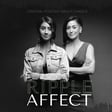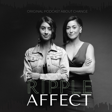
Sofa Series | The Science of Love: Navigating Relationships with Dr. Wendy Walsh
Join us for another engaging episode in our Sofa Series on The Ripple Affect, where co-host Isa "Nibby" sits down with Dr. Wendy Walsh, a PhD in Clinical Psychology and America's Relationship Expert. As the host of "The Dr. Wendy Walsh Show" on iHeartRadio's KFI AM 640 for almost 10 years, Dr. Walsh brings deep insights into the complexities of love, attachment, and the underlying science of romantic behaviors. In this episode, she provides practical advice on breaking unhealthy relationship patterns, the importance of therapy, and how to set boundaries that foster respect and self-esteem. They also delve into how understanding our attachment styles can lead to healthier connections. This episode is essential listening for anyone seeking to deepen their understanding of love, relationships, and personal growth. Enjoy!
For more from Dr. Wendy visit: www.drwendywalsh.com





